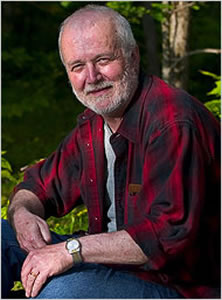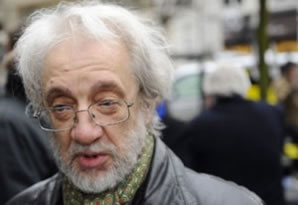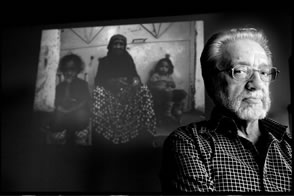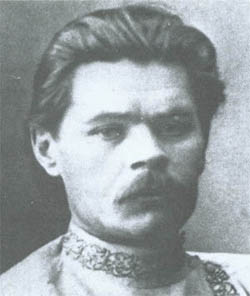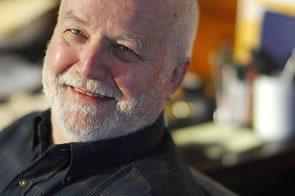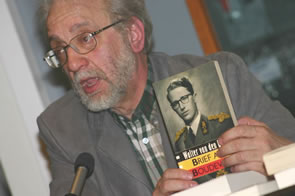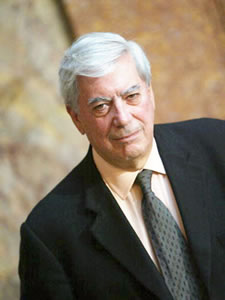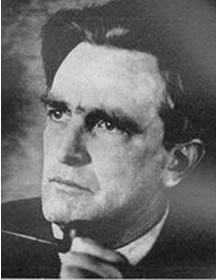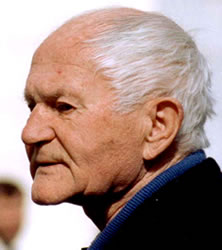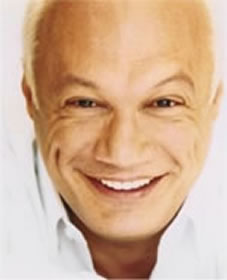De Peruviaanse schrijver Mario Vargas Llosa in Arequipa werd geboren op 28 maart 1936. Zie ook mijn blog van 28 maart 2007 en ook mijn blog van 28 maart 2008.
Uit: Das Fest des Ziegenbocks (Vertaald door Elke Wehr)
“Er wachte auf, gelähmt vom Gefühl einer Katastrophe. Reglos blinzelte er in der Dunkelheit, gefangen in einem Spinnennetz, kurz davor, von einem haarigen Tier voller Augen verschlungen zu werden. Endlich konnte er die Hand zum Nachttisch ausstrecken, auf dem er den Revolver und die Maschinenpistole mit dem eingelegten Magazin aufbewahrte. Aber statt nach de Waffe griff er nach dem Wecker: zehn Minuten vor vier. Er atmete auf. Jetzt war er völlig wach. Alpträume, schon wieder?
Er hatte noch ein paar Minuten; als Pünktlichkeitsfanatiker sprang er nicht vor vier aus dem Bett. Keine Minute früher oder später.
›Der Disziplin verdanke ich alles, was ich bin‹, dachte er. Und diese Disziplin, Kompaß seines Lebens, verdankte er den marines. Er schloß die Augen. Die Zulassungsprüfungen in San Pedro de Macor1´s für die Dominikanische Polizei, die die Yankees im dritten Jahr der Besetzung zu schaffen beschlossen hatten, waren extrem hart. Er bestand sie ohne Schwierigkeiten.
Im Zuge der Ausbildung schied die Hälfte der Anwärter aus. Er genoß jede Übung, bei der Beweglichkeit, Entschlossenheit, Risikobereitschaft oder Widerstandskraft gefragt waren, selbst die brutalen, bei denen es darum ging, Willensstärke und Gehorsam gegenüber dem Vorgesetzten unter Beweis zu stellen: sich mit voller Montur in den Morast werfen oder im Wald überleben, indem man den eigenen Urin trank und sich von Pflanzenstengeln, Gräsern und Heuschrecken ernährte.
Seargent Gittleman hatte ihm die höchste Note gegeben: »Du wirst es weit bringen, Trujillo.« Er hatte es weit gebracht, ja, dank dieser erbarmungslosen, Helden und Mystikern abgeschauten Disziplin, die die marines ihm beigebracht hatten. Er dachte mit Dankbarkeit an den Unteroffizier Simon Gittleman. Ein loyaler, uneigennütziger Gringo in diesem Land von Raffzähnen, Blutsaugern und Idioten. Hatten die Vereinigten Staaten in den letzten einunddreißig Jahren einen aufrichtigeren Freund gehabt als ihn? Welche Regierung hatte sie in der UNO mehr unterstützt? Wer war der erste gewesen, der Deutschland und Japan den Krieg erklärt hatte? Wer schmierte die Repräsentanten, Senatoren, Gouverneure, Bürgermeister, Anwälte und Journalisten der Vereinigten Staaten mit mehr Dollar?”
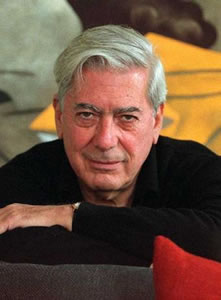
Mario Vargas Llosa (Arequipa, 28 maart 1936)
De Amerikaanse schrijver Nelson Algren werd geboren op 28 maart 1909 in Detroit. Dat is vandaag dus precies honderd jaar geleden. Algren groeide op in Chicago en studeerde journalistiek aan de University of Illinois at Urbana-Champaign. In 1933 werd zijn eerste verhaal gepubliceerd. De doorbraak kwam met zijn roman The Man With the Golden Arm over de morfine-verslaafde pokerspeler Frankie Machine, waarvoor hij in 1950 de National Book Award ontving. In zijn volgende boek Chicago, City on the Make (1951) schetste hij een prachtig portret van de nachtzijde van deze stad met zijn achterafsteegjes, corrupte politici en zwendelaars. Destijds was
niet iedereen er blij mee, maar Chicago eerde de schrijver in 1998 door een fontein naar hem te noemen.In de jaren veertig had Algren een affaire met de Franse schrijfster Simone de Beauvoir. In 1949 reiseden zij samen naar Latijns Amerika. In haar roman De Mandarijnen schreef zij over hem (Lewis Brogan in het boek): „At first I found it amusing meeting in the flesh that classic American species: self-made leftist writer. Now, I began taking an interest in Brogan. Through his stories, you got the feeling that he claimed no rights to life and that nevertheless he had always had a passionate desire to live. I liked that mixture of modesty and eagerness.““
Uit: The Man With the Golden Arm
„Louie was the best fixer of them all because he knew what it was to need to get well. Louie had had a big habit–he was one man who could tell you you lied if you said no junkie could kick the habit once he was hooked. For Louie was the one junkie in ten thousand who’d kicked it and kicked it for keeps.
He’d taken the sweat cure in a little Milwaukee Avenue hotel room cutting himself down, as he put it, “from monkey to zero.” From three full grains a day to one, then half of that and half of that straight down to zero, though he’d been half out of his mind with the pain two nights running and was so weak, for days after, that he could hardly tie his own shoelaces.
Back on the street at last, he’d gotten the chuck horrors: for two full days he’d eaten candy bars, sweet rolls and strawberry malteds. It had seemed that there would be no end to his hunger for sweets.
Louie never had the sweet-roll horrors any more. Yet sometimes himself sensed that something had twisted in his brain in those nights when he’d gotten the monkey off his back on Milwaukee Avenue.
“Habit? Man,” he liked to remember, “I had a great big habit. One time I knocked out one of my own teet’ to get the gold for a fix. You call that bein’ hooked or not? Hooked? Man, I wasn’t hooked, I was crucified. The monkey got so big he was carryin’ me. “Cause the way it starts is like this, students: you let the habit feed you first ’n one mornin’ you wake up ’n you’re feedin’ the habit.
“But don’t tell me you can’t kick it if you want to. When I hear a junkie tell me he wants to kick the habit but he just can’t I know he lies even if he don’t know he does. He wants to carry the monkey, he’s punishin’ himself for somethin’ ’n don’t even know it. It’s what I was doin’ for six years, punishin’ myself for things I’d done ’n thought I’d forgot. So I told myself hwo I wasn’t to blame for what I done in the first place, I was only tryin’ to live like everyone else ’n doin’ them things was the only way I had of livin’. Then I got forty grains ’n went up to the room ’n went from monkey to nothin’ in twenny-eight days ’n that’s nineteen years ago ’n the monkey’s dead.”
“The monkey’s never dead, Fixer,” Frankie told him knowingly.“
Nelson Algren (28 maart 1909 – 9 mei 1981)
De Nederlandse dichter Chrétien Breukers werd geboren op 28 maart 1965 in het Limburgse Leveroy. Zie ook mijn blog van 12 oktober 2008 en ook mijn blog van 28 maart 2008.
OFFERFEEST
Ik ben lam en slager, prooi en jager.
Zonder mij bestaat de jager niet.
Zonder mij verlabbekakt de prooi.
Het mes dat mij de keel afsnijdt, is scherp
en wordt met vakmanschap bestuurd.
De man die mij de keel afsnijdt, is zacht
en prevelt troost en streelt mijn vacht.
Bloed. Het stinkt. Ik gorgel. Nog even
en in mijn hoofd wordt alles licht.
De slager doet mijn ogen dicht.
Ik ben voedsel op het offerfeest.
Zonder ons gaat dat dit jaar niet door.
Ik ben de slager en ik steek het lam.
Ik ben het lam en laat de slager doen.
Ik ben voorzegd, verwekt, vermoord
Ik ben ter helle neergedaald. Via de trappen
van het licht ging ik, wantrouwig en gestaag,
omhóóg. Ik was zelfs voor ik leefde
zo verweven met de tekst die mij beschrijven
zou. Ik was het zelf, maar kon daar niets
aan doen. Mijn huid omgaf steeds ijler leegte.
Steeds blinder zou ik tasten naar zijn
lijfelijk bestaan. Steeds dover zou ik
luisteren naar slechts één woord.
Het is de leegte en het rekt zich uit.
Het houdt zich stil en laat mij ongewis.
Het is mijn vader en hij is er niet.
Chrétien Breukers (Leveroy, 28 maart 1965)
De Amerikaanse schrijfster Lauren Weisberger werd geboren op 28 maart 1977 in Scranton, Pennsylvania en verhuisde op haar elfde naar Allentown, Pennsylvania, waar ze les volgde aan Parkland High School. In 1999 behaalde ze een diploma in Engels aan Cornell University. Na haar studies maakte ze een reis door Europa, Israël, Egypte, Jordanië, Thailand, India, Nepal en Hong Kong. Na die wereldreis scoorde ze haar eerste echte job: assistente van de hoofdredactrice van Vogue, Anna Wintour. Over deze job schreef ze haar eerste boek, The Devil Wears Prada. Daarna volgden, in 2005, Gucci & Gossip en, in 2008, Chanel Chic. The Devil Wears Prada werd in 2006 verfilmd.
Uit: The Devil Wears Prada
“The light hadn’t even officially turned green at the intersection of 17th and Broadway before an army of overconfident yellow cabs roared past the tiny deathtrap I was attempting to navigate around the city streets. Clutch, gas, shift (neutral to first? Or first to second?), release clutch, I repeated over and over in my head, the mantra offering little comfort and even less direction amid the screeching midday traffic. The little car bucked wildly twice before it lurched forward through the intersection. My heart flip-flopped in my chest. Without warning, the lurching evened out and I began to pick up speed. Lots of speed. I glanced down to confirm visually that I was only in second gear, but the rear end of a cab loomed so large in the windshield that I could do nothing but jam my foot on the brake pedal so hard that my heel snapped off. Shit! Another pair of seven-hundred-dollar shoes sacrificed to my complete and utter lack of grace under pressure: this clocked in as my third such breakage this month. It was almost a relief when the car stalled (I’d obviously forgotten to press the clutch when attempting to brake for my life). I had a few seconds–peaceful seconds if one could overlook the angry honking and varied forms of the word “fuck” being hurled at me from all directions–to pull off my Manolos and toss them into the passenger seat. There was nowhere to wipe my sweaty hands except for the suede Gucci pants that hugged my thighs and hips so tightly they’d both begun to tingle within minutes of my securing the final button. My fingers left wet streaks across the supple suede that swathed the tops of my now numb thighs. Attempting to drive this $84,000 stick-shift convertible through the obstacle-fraught streets of midtown at lunchtime pretty much demanded that I smoke a cigarette.”
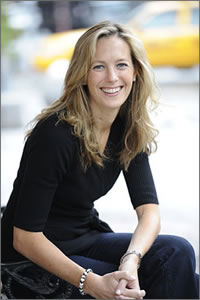
Lauren Weisberger (Scranton, 28 maart 1977)
De Russische schrijver Maksim Gorki (pseudoniem van Aleksej Maksimovitsj Pesjkov) werd geboren in Nizjni Novgorod op 28 maart 1868. Zie ook mijn blog van 28 maart 2007 en ook mijn blog van 28 maart 2008
Uit: The Lower Depths
“PEPEL: I told you — I’m through with being a thief, so help me God! I’ll quit! If I say so, I’ll do it! I can read and write — I’ll work — He’s been telling me to go to Siberia on my own hook — let’s go there together, what do you say? Do you think I’m not disgusted with my whole life? Oh — Natasha — I know . . . I see . . . I console myself with the thought that there are lots of people who are honored and respected — and who are bigger thieves than I! But what good is that to me? It isn’t that I repent . . . I’ve no conscience . . . but I do feel one thing: One must live differently. One must live a better life . . . one must be able to respect one’s own self . . . I’ve been a thief from childhood on. Everybody always called me “Vaska — the thief — the son of a thief!” Oh — very well then — I am a thief — . . . just
imagine — now, perhaps I am a thief out of spite — perhaps I’m a thief because no one ever called me anything different. Come with me. You’ll love me after a while! I’ll make you care for me . . . if you’ll just say yes! For over a year I’ve watched you . . . you’re a decent girl . . . you’re kind — you’re reliable — I’m very much in love with you. Please — feel a little sorry for me! My life isn’t all roses — it’s a hell of a life . . . little happiness in it . . . I feel as if a swamp were sucking me under . . . and whatever I try to catch and hold on to, is rotten . . . it breaks . . . Your sister — oh — I thought she was different . . . if she weren’t so greedy after money . . . I’d have done anything for her sake, if she were only all mine . . . but she must have someone else . . . and she has to have money — and freedom . . . because she doesn’t like the straight and narrow . . . she can’t help me. But you’re like a young fir-tree . . . you bend, but you don’t break. . . . Come, Natasha! Say yes!”

Maksim Gorki (28 maart 1868 – 18 juni 1936)
De Amerikaanse schrijver Russell Banks werd geboren op 28 maart 1940 in Newton, Massachusetts. Zie ook mijn blog van 28 maart 2007 en ook mijn blog van 28 maart 2008.
Uit: Trailerpark
“The story of Flora Pease, how she got to be the way she is now, isn’t all that uncommon a story, except maybe in the particulars. You hear often in these small New Hampshire towns of a woman no one will deal with anymore, except to sell her something she wants or needs-food, clothing or shelter. In other words, you don’t have a social relationship with a woman like Flora, you have an economic one, and that’s it. But that’s important, because it’s what keeps women like Flora alive, and after all, no matter what you might think of her, you don’t want to let her die, because if you’re not related to her somehow, you’re likely to have a friend who is, or your friend will have a friend who is, which is almost the same thing in a small town. And not only in a small town, either-these things are true for any group of people that knows its limits and plans to keep them.
When Flora Pease first came to the trailerpark and rented number 11, which is the second trailer on your left as you come in from Old Road, no one in the park thought much about her one way or the other. She was about forty or forty five, kind of flat-faced and plain, a red-colored person, with short red hair and a reddish tint to her skin. „
Russell Banks (Newton, 28 maart 1940)
De Vlaamse roman- en toneelschrijver Walter van den Broeck werd geboren in Olen op 28 maart 1941. Zie ook mijn blog van 28 maart 2007 en ook mijn blog van 28 maart 2008.
Uit: Het Beleg van Laken
“Net als in België zelf schuurden ook thuis twee aan elkaar tegengestelde kulturen en temperamenten met veel misbaar langs elkaar heen. De braam die zich tussen de smalle raakvlakken vormde ben ikzelf, een mengsel van Germaans en Latijns puin, en het gekrijs waarmee het tot stand kwam is mijn moedertaal: een krom Nederlands met Franse strukturen. Als de heer Loracq gelijk heeft, ben ook ik uiteindelijk een product van Schoonenberg, net als België zelf. Als hij gelijk heeft, ben ik onmiskenbaar een Belg, misschien wel een van de weinige èchte.”
Walter van den Broeck (Olen, 28 maart 1941)
De Zweedse schrijfster Marianne Fredriksson werd geboren in Göteborg op 28 maart 1927. Zie ook mijn blog van 12 februari 2007 en ook mijn blog van 28 maart 2007 en ook mijn blog van 28 maart 2008.
Uit: Two Women
“We meet in the garden center.
We are separated by a huge trolley, some three meters by eight, filled with thousands of pansies. An unruly blue and purple sea, with flashes of yellow like waves glittering in the sun.
She is standing directly opposite me, and her face reflects my own delight. I gesture towards the flowers, saying something about how wonderful they look. She smiles broadly and replies that there is nothing like flowers for making you feel that life’s worth living. “Or maybe small children too,” she adds. This startles me. She speaks good but accented Swedish and I realize she must be an immigrant, perhaps from Chile.
“I haven’t thought about it like that,” I say. “But you’re right, of course.”
Then we both react to the wind rattling the panes in the roof of the tall greenhouse and agree that it is too early in the year to plant our pansies. Every night still brings a touch of frost. “And then there’s the wind,” she says.
We hug our coats tighter as we walk from the greenhouse to the shop.
“My name’s Ingegerd,” I tell her. “People call me Inge.”
“And I’m called Edermira, but here in Sweden it’s Mira.”
We nod, as if to signify that things somehow feel right. I am curious about her.
A little later Mira is speaking quickly and eagerly to the girl behind the counter. She is asking for the bulbs of . . . She is forced to halt, close her eyes, think and find the right name. In Spanish.”
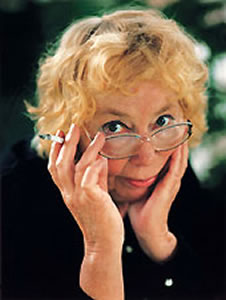
Marianne Fredriksson (28 maart 1927 – 11 februari 2007)
De Tsjechische schrijver Bohumil Hrabal werd geboren in Brno-Židenice op 28 maart 1914. Zie ook mijn blog van 28 maart 2007 en ook mijn blog van 28 maart 2008.
Uit: In-House Weddings (Vertaald door Tony Liman)
“THE BUILDING I WAS LOOKING FOR WAS QUITE FINE-OUT IN FRONT of its main entrance stood a gas lamppost; the sidewalk, once checkered, had most certainly been torn up ages ago and most recently filled in again. The gas lamp was already lit, so I was able to decipher the house number correctly: twenty-four. When I stepped inside, the hallway smelled of the cold and spilled wine. The walls were damp, peeling like puff pastry. When I walked through the hallway, out into the small courtyard, I had to jump back. A blonde in violet panties and bra was splashing bucketfuls of water around the yard, up as high as the windows, then brushing the water away into the gutter. She was in a sweat, scowling, focused on her work. Again she took a bucket of water, a bucket into which the water gushed from an open tap, hung the empty bucket on the brass tap, and again splashed water onto the cement yard. I said, “Is Miss Liza home?”
“She’s not, but ask the doctor, he’s washing floors, too, you see we need to keep it clean here, the whole building walks past my windows, and I’m a neat woman!” So said the saturnine blonde, and perhaps in an effort to prove what she said, she collided with my shoulder in pushing by into the hallway to flick the switch on in her room, and I could actually see her place was unbelievably clean: a polished stove and a polished wardrobe, atop which lay an ostrich-feather fan, and under the window was a plushly upholstered couch decorated with velvet pillows, and a table laid with a tablecloth, in the center of which glowed a vase full of artificial flowers, wild poppies.”
Bohumil Hrabal (28 maart 1914 – 3 februari 1997)
De Franstalige dichter uit Guyana Léon-Gontran Damas werd geboren op 28 maart 1912 in Cayenne. Zie ook mijn blog van 12 februari 2007.
Bouclez-la
Bouclez-
la
muselez-
la
fermez-
la
vous toutes
avec vos guilleris de moinesses
avec
vos gloussements
de nonnes refoulées
qui voulez l’être
souhaitez l’être
priez dieu pour l’être
de tout votre être
Bouclez-la
muselez-la
fermez-la
Un mot
un seul de plus
et je
et je vous
et je vous vi
et je vous vi-o-le
et je vous viole à la cousin germain D’CHIMBO
le ROUN’GOU
dont la terreur invisible
berçait à la nuit tombée
naguère encore
les filles impubères
de mon Pays
Léon-Gontran Damas (28 maart 1912 – 22 januari 1978)
De Franse schrijver en dramaturg Éric-Emmanuel Schmitt werd geboren op 28 maart 1960 in Lyon. Zie ook mijn blog van 28 maart 2007.
Uit: Monsieur Ibrahim und die Blumen des Koran (Vertaald door Annette Bäcker, Paul Bäcker)
„Zweihundert Francs waren also im Schweinebauch. Zweihundert Francs, das war der Preis für ein Mädchen in der Rue de Paradis. Das mußte zahlen, wer ein Mann werden wollte. Die ersten haben mich nach meinem Ausweis gefragt. Trotz meiner Stimme, trotz meines Gewichts – ich war dick wie ein Sack Zucker – zweifelten sie daran, daß ich sechzehn war, wie ich behauptet hatte, wahrscheinlich hatten sie mich in all den letzten Jahren mit meinem Einkaufsnetz vorbeigehen und heranwachsen sehen. Am Ende der Straße, in dem Toreingang, stand eine Neue. Sie war mollig und schön wie ein Bild. Ich zeigte ihr mein Geld. Sie lächelte. »Und du bist sechzehn?« »Ja, seit heute morgen.« Wir sind raufgegangen. Ich konnte es kaum glauben, sie war zweiundzwanzig, sie war alt, und sie war ganz für mich da. Sie hat mir erklärt, wie man sich wäscht, und dann, wie man Liebe macht … Natürlich wußte ich das schon, aber ich hab sie reden lassen, damit sie sich besser fühlt, außerdem mochte ich ihre Stimme, sie klang ein bißchen trotzig, ein bißchen traurig. Die ganze Zeit über war ich halb ohnmächtig. Zum Schluß hat sie mir dann übers Haar gestreichelt und sanft gesagt: »Du mußt wiederkommen und mir ein kleines Geschenk mitbringen.« Das hätte mir meine Freude beinahe vermasselt: Ich hatte das kleine Geschenk vergessen. Da haben wir’s, ich war ein Mann, getauft zwischen den Schenkeln einer Frau, ich konnte mich kaum auf den Beinen halten, so zitterten mir noch die Knie, und schon begann der Ärger: Ich hatte das berühmte kleine Geschenk vergessen.”

Éric-Emmanuel Schmitt (Lyon, 28 maart 1960)
De Deens-Duitse dichter Adolph Wilhelm Schack von Staffeldt werd geboren op 28 maart 1769 in Garz / Rügen. Hij stamde uit een oud adelijk geslacht uit Pommern, maar besloot Deen te worden. Tussen 1795 en 1800 reisde hij door Duitsland, Frankrijk, Zwitserland, Oostenrijk en Italië. Zijn brieven en gedichten, tijdens deze reizen ontstaan werden in de Deense salons veel gelezen, evenals zijn uitvoerige Wiener Tagebuch.
Die Herbstrose
Zwar kann nicht mehr ich mit dem Jüngling ringen
die Kniee brechen, und die Sehn’ erschlafft,
im Herzen aber fühl´ich Jünglingskraft
und schlag den Äther mit des Geistes Schwingen.
Drum kann ich auch das All der Welt durchdringen
und mir zueignen, was Natur erschafft,
erlösen,selig-liebend aus der Haft,
was noch beharret in der Selbstheit schlingen.
Drum müsstest du, o süsses Mädchen! mir,
an meiner Liebe Inbrunst mir erwarmen
und liebend lächeln in des Sängers Armen:
Der späten Rose gleich, des Gartens Zier,
die, wenn der Herbst, dem Sommer gleich, entbrennet,
zu diesem nicht, zu jenem sich bekennet
Schack von Staffeldt (28 maart 1769 – 26 december 1826)
De Franse dichter, schrijver en criticus Arsène Houssaye werd geboren op 28 maart 1815 in Bruyères. In 1836 verschenen zijn romans „La couronne de bluets“ en „La pécheresse“. Hij was bevriend met de schrijvers Jules Janin en Théophile Gautier die de deuren van de Parijse salons voor hem openden. In 1849 werd hij administrator van de Comédie-Française. In de zeven jaar dat hij er werkte wist hij aardig wat successen te behalen, zowel op artistiek als op financieel gebied.
Uit: Les grandes dames
« Les curieuses des bords du Lac se demandaient ce jour-là avec inquiétude pourquoi M. de Parisis n’avait pas encore paru ?
Jean-Octave de Parisis, surnommé Don Juan de Parisis, était un homme du plus beau monde parisien ;-un dilettante partout, à l’Opéra, à la Comédie-Française, dans l’atelier des artistes ;-un virtuose quand il conduisait son breack victorieux, quand il jouait au baccarat, quand il pariait aux courses, quand il prêchait l’athéisme, quand il donjuanisait avec les femmes.
C’est un quasi-ambassadeur. Aussi, selon les perspectives, disait-on :-C’est un homme sérieux,-ou :-C’est un désoeuvré.
Les femmes disaient : «Il porte l’Enfer avec lui.»
Le duc de Parisis n’était pas au bord du Lac, parce qu’il se promenait à cheval dans l’avenue de la Muette. Il avait pris le chemin des écoliers pour suivre un landau à huit ressorts. C’est que dans ce landau il voyait une jeune fille qu’il n’avait jamais rencontrée, lui qui connaissait toutes les femmes et toutes les jeunes filles du beau Paris, comme Théophile Gautier connaissait toutes les figures du Louvre.
Cette jeune fille était accompagnée d’une dame en cheveux blancs qui avait grand air. Toutes deux descendirent de voiture pour se promener dans une allée solitaire, en femmes qui ne vont au Bois que pour le bois.”
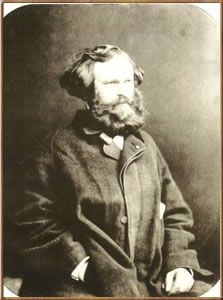
Arsène Houssaye (28 maart 1815 – 26 februari 1896)
Zie voor onderstaande schrijver ook mijn blog van 28 maart 2007.
De Nederlandse dichter en romanschrijver Martien Beversluis werd geboren in Barendrecht op 28 maart 1894














